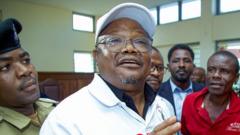After surviving an assassination attempt and now facing treason charges, Tundu Lissu's leadership in Tanzania's political climate is increasingly at risk. His party, Chadema, is banned from upcoming elections and divisions within the party complicate efforts for reform. Despite the dangers, Lissu remains steadfast in his fight for democracy and justice.
Tundu Lissu Faces Treason Charges Amidst Political Turmoil in Tanzania

Tundu Lissu Faces Treason Charges Amidst Political Turmoil in Tanzania
The leader of Tanzania’s opposition party, Chadema, Tundu Lissu, confronts grave treason charges and political repression as he calls for major electoral reforms.
In Tanzania, the political landscape is looking increasingly perilous for Tundu Lissu, leader of the main opposition party Chadema. Recently facing treason charges, Lissu's commitment to fighting for democratic reforms has led many to speculate whether he has reached a critical juncture in his political career.
The treason charge against him, which carries the ultimate penalty of death, hasn't deterred Lissu. In the lead up to presidential and parliamentary elections in October, he remains determined to pressure the government for reforms, even while being detained for the past two weeks. Lissu has previously voiced his beliefs that substantial political changes won’t come easily, stating that demonstrators will need courage to claim their rights.
Lissu, a formidable presence in Tanzanian politics, openly criticized his party's previous leadership style, feeling it was too lenient towards the ruling CCM government. In a move that surprised many, he successfully ousted then-chairman Freeman Mbowe to assume control of Chadema. However, just months after taking office, Lissu was arrested and now faces accusations of inciting public rebellion. Pleading not guilty to the charge of publishing false information, he awaits his court reappearance without the option of bail due to his treason charge.
Prior to this unsettling turn of events, Lissu had energized opposition supporters with the rallying cry of "no reforms, no elections." His stance is that without major reforms to end a system perceived as rigged in favor of CCM, participating in the elections is futile. The CCM party has consistently triumphed in past elections, holding every seat since the country’s independence.
Chadema’s impending election disqualification results from their refusal to sign a code of conduct that the government asserts is necessary for peaceful elections. Lissu and his supporters view the code as an attempt to suppress opposition sentiments. The recent brutal killing of a senior Chadema official amid heightened state-sponsored violence has only intensified fears among party members.
Despite calls from various entities, including the Catholic Church and organizations like Human Rights Watch for Lissu's release and fair elections, the government continues to silence dissenting voices. Political observers note that the current regime under President Samia Suluhu Hassan, which initially appeared to be fostering openness, has begun reverting to past oppressive practices.
Lissu, however, has concrete proposals for reform, including the establishment of an independent electoral commission, impervious to government influence, as well as measures to guarantee the integrity of the voting process. But such aggressive strategies have also sparked internal discord within Chadema, where the G-55 faction argues for a more conciliatory approach toward negotiations with the government.
Opposition discourse in Tanzania is complicated further by fragmented stances on engagement in elections, as the second-largest opposition party, ACT-Wazalendo, has signed the contentious code of conduct to participate in the electoral process.
While Lissu envisions a model similar to Kenya's past protests that successfully demanded political change, many Tanzanians are hesitant to openly support such potentially hazardous dissent. Lissu’s lawyer, Robert Amsterdam, reflects on the growing unrest and the urgency of activism, asserting that Chadema will leverage every available avenue for change, despite political and legal hurdles limiting their immediate impact.
Political analysts have expressed concerns that a failure in these elections could further undermine Chadema’s status as the main opposition party, presenting an opening for other parties to capitalize on their struggles. The risk is high, but Lissu seems willing to confront the challenging path ahead in pursuit of democracy for Tanzanians.





















